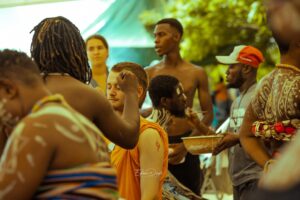A good spoken word artist feasts on the emotions of the audience he entertains. Kwame Brenya has the gift of gauging the ability of his audience to his performances. It is a skill that he uses to attract the attention of his audience, and he does so well until he exits the stage.

A wordsmith gifted with the ability to make ordinary words sound pleasing to the ears, Kwame Brenya got hold of the microphone and mesmerised the crowd with his performance. Shirtless, and his body covered in paintings, mostly symbols.
Brenya’s performance exposes the hypocrisy of latter-day prophets and how they mislead their flocks, but he said the truth shall however set the flock free because the prophetic lies shall not remain forever.

He was one of the many artists (visual artists, dancers, choreographers), who took part in this year’s Freedom Parade 2022 organised by Nkyinkyim Museum at Nuhalenya, Ada. Under the artistic guidance of visual artist and sculptor Kwame Akoto-Bamfo, the parade was a symbolic ceremony in commemoration of African ancestry and the victories of emancipation from all forms of bondage – physical and spiritual.
The ceremony involved the parading of Africans and people of African descent from the diaspora and a general audience through the sacred ground in three separate marches. As part of the event, patrons were treated to African body painting and communal theatre. Again, it also allowed for them to pay homage to undented African arts and unique cultures.

Five different cultural troupes were invited to the event, and each was allotted specific time to perform any dance of their choice. The theatrics of the performances mostly emulated the freeing of Africans from various forms of bondage by parade leaders.
Despite the educational elements embedded in the parade, it also created the platform for a spiritual exercise to reconnect with African ancestral roots.
Three different personalities led the marches to the sacred ground. Grammy nominee Rocky Dawuni and Efo Sela, a brilliant visual artist, led the march in memory and honour of our ‘fathers’. Their speeches reminded Africans of the need to emancipate their minds from the shackles of oppression and miseducation.
The first march was led by Louisa Akpoto-Narh, who called for the law enforcement agencies to provide support for vulnerable persons in the society against rape and any form of sexual molestation. The well-attended parade was also an opportunity to atone and celebrate the lives and sacrifices of African ancestors.

In the third and final march dedicated to children, Nikel Kafui Agama, 12, spoke against the existing visa restrictions that make it impossible for Africans to freely travel around the continent. “I say this because I know it is hard for Africans to travel anywhere outside our continent without facing visa challenges. If it is so, then at least I wish to travel on the continent of Africa freely,” she said.
Draped in a beautiful kente cloth, Miss Agama also called for equal opportunities for children in the country, irrespective of their tribe or home region.










